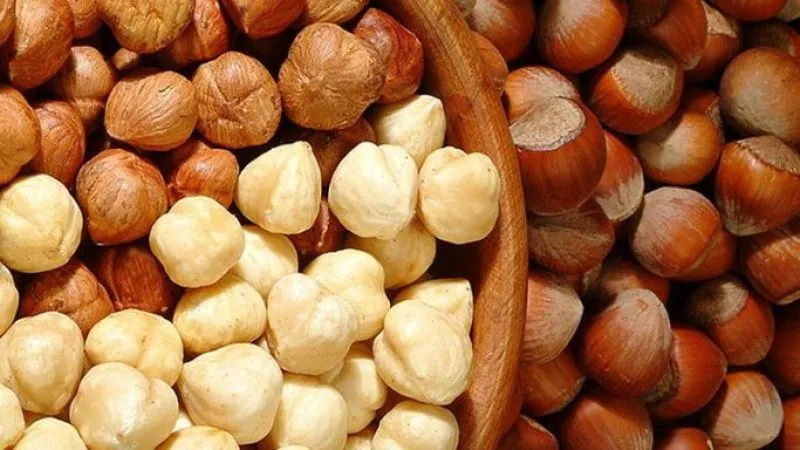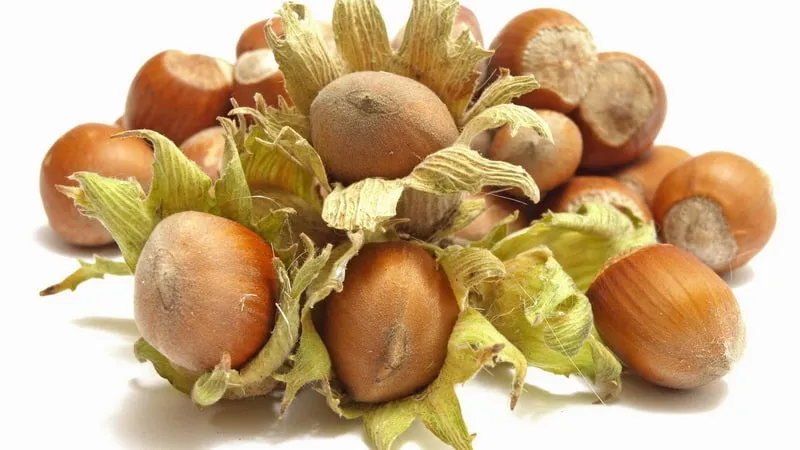Hazelnuts are among the most popular and nutritious nuts. Loved by both children and adults, these nuts are often added to chocolates and confectionery. In terms of nutrient content, hazelnuts rank second only to walnuts and are far healthier than other nuts like peanuts, Brazil nuts, cashews, and even pine nuts.
Read on to discover the health benefits and potential drawbacks of hazelnuts for women.
Table of contents
Nutritional Composition and Caloric Value of Hazelnuts

Hazelnuts rank highly among nuts due to their rich content of vitamins, macronutrients, and trace elements. Just one kernel contains half the daily requirement of manganese, while monounsaturated Omega-9 fatty acids make up half its weight—these help dissolve cholesterol plaques.
Nutritional composition and energy value per 100 g:
- Protein – 17.1%;
- Fats – 61.2%;
- Carbohydrates – 4.9% (nearly half of which is fibre);
- Water – 5%;
- Caloric content – 670 kcal.
Hazelnuts are the richest nuts in vitamins, minerals, and essential amino acids. Despite their high fat content, most of these fats consist of beneficial mono- and polyunsaturated fatty acids, which are vital for the body and even support weight loss.
Vitamins per 100 g:
- B1 – 0.48 mg – regulates protein and carbohydrate metabolism;
- B2 – 0.11 mg – strengthens immunity and prolongs vitality;
- B5 – 1.1 mg – fights microbes and aids hormone synthesis;
- B6 – 0.7 mg – supports nervous system function and reduces fat and cholesterol levels;
- B9 – 0.08 mg – the key "female" vitamin, crucial during pregnancy to prevent miscarriage and ensure foetal development;
- C – 2.0 mg – boosts immunity and aids in collagen and hyaluronic acid production;
- E – 17.5 mg – a powerful antioxidant that repairs cell membranes and protects against free radicals.
Macronutrients per 100 g:
- Potassium – 700.0 mg – maintains proper intracellular pressure;
- Calcium – 170.0 mg – strengthens bones;
- Magnesium – 172.0 mg – the "metal of life," essential for synthesising around 300 enzymes in the body;
- Sulphur – 190.0 mg – aids collagen production, keeping skin, hair, and nails youthful;
- Phosphorus – 310.0 mg – builds bones and teeth and supports protein synthesis.
Trace elements per 100 g:
- Aluminium – 425 mcg – supports tissue regeneration;
- Boron – 200 mcg – reduces inflammation and regulates fat metabolism;
- Vanadium – 100 mcg – has anti-tumour properties and reduces insulin requirements for diabetics;
- Iron – 3000 mcg – essential for oxygen transport;
- Manganese – 10000 mcg – necessary for absorbing vitamins B, C, and E;
- Copper – 1600 mcg – aids in collagen and elastin production;
- Zinc – 2500 mcg – maintains healthy skin, hair, and nails.
Health Benefits of Hazelnuts for Women

The nutrients in hazelnuts are incredibly valuable for overall health. Their high content of "female-friendly" vitamins and minerals explains why women love these nuts so much.
General Health Benefits
The Omega-6 and Omega-9 fatty acids in hazelnuts are a great alternative for women who don’t eat fish. These essential fats must come from food, as the body cannot produce them. A deficiency can lead to issues in the nervous, cardiovascular, and endocrine systems. Omega-6 and Omega-9 also aid in weight management and keep skin youthful.
Hazelnuts contain more essential amino acids than any other food. A lack of these can cause:
- Premature skin ageing and wrinkles;
- Depression;
- Low haemoglobin levels, reducing oxygen supply to tissues;
- Digestive problems;
- Hair loss and brittle nails.
Regular consumption of hazelnuts with honey and dried apricots boosts immunity and supports heart health.
The fatty acids and trace elements in hazelnuts regulate lipid metabolism, preventing weight gain. They also cleanse blood vessels and increase good cholesterol levels. For women going through menopause, hazelnuts reduce the risk of heart attacks and strokes.
Women suffering from varicose veins, thrombophlebitis, or atherosclerosis will benefit from hazelnuts, as they reduce swelling, strengthen blood vessels, and improve overall well-being.
The full spectrum of B vitamins protects against fatigue, stress, mood swings, insomnia, and headaches.
Hazelnuts also enhance mental performance, protect against overexertion, and improve memory.

During Pregnancy and Breastfeeding
During pregnancy, hazelnuts support the development of the baby’s bones, nervous system, and cardiovascular system. For the mother, they provide endurance, emotional stability, and protection against stretch marks. The vitamins and minerals help maintain hormonal balance, healthy haemoglobin levels, and a strong immune system.
While breastfeeding, hazelnuts improve lactation and milk quality, enriching it with proteins, healthy fats, vitamins, and minerals.
Important! Do not exceed the recommended daily intake during breastfeeding, as it may cause digestive issues or allergies in the baby.
For Weight Loss
A diet that includes hazelnuts can aid weight loss. The fats in hazelnuts are not stored but help regulate lipid metabolism.
Their protein content rivals that of meat and fish. Hazelnuts curb hunger, stabilise blood sugar, and detoxify the liver and digestive tract.
The vitamin and mineral content maintains energy levels during calorie restriction and prevents mood dips.
Important! Excessive consumption can lead to weight gain.
Recommended Daily Intake

The recommended daily intake for women is 30-40 g (about 10-12 nuts). Men can consume up to 50 g, while children under 3 should avoid hazelnuts. For older children, a small handful per day is sufficient.
Use in Traditional Medicine
Hazelnuts, their shells, leaves, and bark are used in folk remedies, often combined with milk, honey, or herbal infusions.
Medicinal Properties
Hazelnuts are used in folk medicine to treat:
- Gout;
- Diabetes (glycemic index: 15);
- Constipation;
- Colds;
- Varicose veins;
- Gastritis and pancreatitis (outside flare-ups).
They are also believed to help with epilepsy, gallstones, parasites, and anaemia.
Methods of Use

Infusions from hazelnut leaves fight colds and boost immunity. A salve made from catkins is used for thrombophlebitis, haemorrhoids, and cervical erosion. Hazelnuts with honey increase haemoglobin levels.
Fermented hazelnut leaf tea lowers blood pressure and relieves leg pain from varicose veins. A bark decoction stops bleeding and treats thrombophlebitis.
Alcohol tinctures are used for asthma, tuberculosis, and tumours.
Contraindications and Potential Risks
Hazelnuts are safe in moderation but may cause diarrhoea, allergies, or stomach discomfort if overconsumed. Avoid them during digestive flare-ups or if allergic.
Conclusion
A daily handful of hazelnuts strengthens bones, heart, and blood vessels, reduces stress, boosts productivity, and enhances skin, hair, and nail health. They aid digestion, lower cholesterol, support weight loss, and improve cognitive function.
During pregnancy and breastfeeding, hazelnuts promote foetal development and enrich breast milk. However, excess consumption may cause digestive issues or weight gain.







